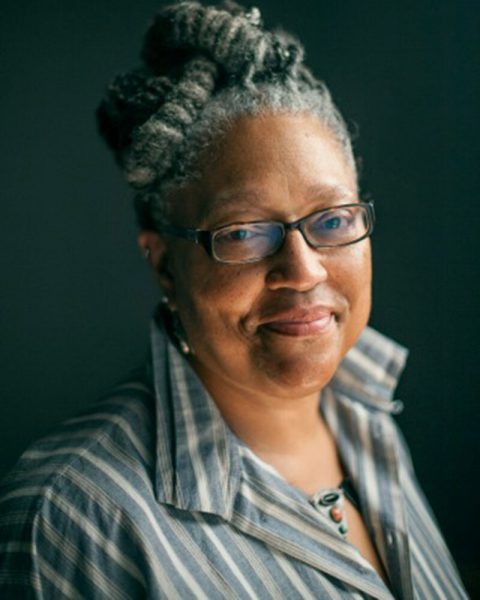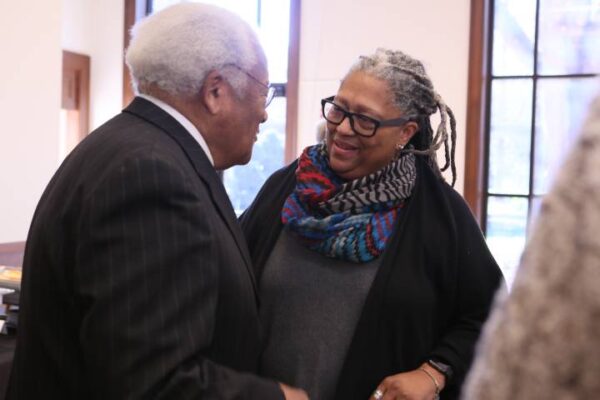
Emilie M. Townes, University Distinguished Professor of Womanist Ethics and Society and University Distinguished Professor of Gender and Sexuality, will conclude her deanship of the Divinity School on June 30. Townes, who also holds the E. Rhodes and Leona B. Carpenter Chair in Ethics and Society, will rejoin the faculty in 2024 after a sabbatical. In this Q&A, she reflects on her deanship and the school’s areas of growth and progress during the past decade.
1. What surprised you the most about Vanderbilt Divinity School during the early days of your leadership?
The universally shared vision of the strengths and areas for growth and weakness that the faculty and staff had about the school. I interviewed all of the staff before I arrived and all of the faculty members during my first fall semester with one question: What do you see as the strengths and weaknesses of the school? It is rare, I think, to find such a common vision among both faculty and staff. It was also a tremendous relief that this was the case as it made it somewhat easier to begin building a sense of community together. The process has enabled us to live more fully into what we want to be as a school—one that is so bold as to call itself Schola Prophetarum, School of the Prophets.
2. What are your proudest accomplishments as dean?
- Working with the faculty to build a greater sense of trust and community so that we can have candid conversations about matters of governance. This is a work in progress, but it is my hope that we will continue to live into this with our next dean.
- The curriculum redesign (which I dubbed the curriculum transformation) that was long overdue. We did the hard work of assessing our strengths and growth areas to look at what are the attributes of a dynamic and rigorous embedded theological school in an R1 university. What is relevant and necessary for teaching and learning as we seek to build leaders for religious and academic institutions? This, too, is a work in progress.
- The building renovation has given us a new atmosphere that represents our values and also gives us some room to grow. The pandemic slowed this somewhat, but we are beginning to more fully live into the possibilities our new space affords.
- The establishment of the James Lawson Institute for the Research and Study of Nonviolent Movements in partnership with the College of Arts and Science.
3. How has the school’s curriculum changed during your tenure?
It is transformed! We now have 10 concentrations for the master’s programs (M.Div. and M.T.S.), a new master’s degree—master of theology (Th.M.)—and a revived doctor of ministry (D.Min.) program that focuses on integrative chaplaincy. We are working to better integrate our six co-curricular programs into the core curriculum:
- Cal Turner Program for Moral Leadership in the Professions
- Carpenter Program in Religion, Gender and Sexuality
- Kelly Miller Smith Institute on Black Church Studies
- Religion in the Arts and Contemporary Culture Program
- Public Theology and Racial Justice Collaborative
- Wendland-Cook Program in Religion and Justice
4. What is the relevance and importance of the Divinity School’s motto Schola Prophetarum—School of the Prophets—in today’s world?
We aspire to be more than cheerleaders for the status quo and instead strive to participate with God as partners in transforming the world into a place of love, peace and justice. We do so in our scholarship, in our teaching, and in our service—internal and external—to the school. We live as a rigorous academic- and practice-based institution that also believes in the power of hope for and in this world. All of this means that we must be the bearers of the God news that the world we have now is not God’s final word for creation.
5. How is Vanderbilt Divinity School uniquely situated among top-tier institutions for theological education?
Our theological approaches run the gamut from orthodox to liberationist with all the stops in between. We are not tied to a particular denomination, though we do acknowledge our Methodist roots. This means that we have a rich variety of denominational and religious viewpoints in our faculty, staff and students. And in what I believe is the hallmark of a liberal school, we try to live into a big-tent Christian tradition that welcomes dialogues across the theological, racial, gender, class (and more) identities that make up our community—and also in the larger world—as we strive to be more interreligious as we go. This is all an amazing and invigorating work in progress.

6. Can you provide any examples of how the Divinity School impacts and shapes the rest of Vanderbilt University?
There are two things that come to mind immediately: First, our co-curricular programs sponsor networking and programming that involve faculty and students across the university. We try to make all our events for the six co-curricular programs accessible to all. Second, the James Lawson Institute for the Study and Research of Nonviolent Movements has growing outreach across the university as it seeks to not only teach and do research about the efficacy of nonviolence, but also to help those involved in its growing list of programs think through how to employ what folks learn in our everyday lives.
7. Do you plan to teach after stepping down as dean, and any plans yet for your next chapter of research?
Yes, I am looking forward to going back to full-time teaching when I step down. It will be close to 20 years since I was in the classroom as a full-time teacher, so I will have some “rust” to knock off. I am looking forward to my research leave to gear up and be ready! As for my research plans, this is very much a work in progress. Just as I was beginning my last sabbatical, the invitation to join Vanderbilt as dean of Divinity arrived and halted my research. I had gotten just far enough into the project I had planned to realize that what I had anticipated working on would not fly, so I was shifting gears. Over the last 10 years, I think that project’s ship has sailed and I anticipate returning to a concept I developed in my last solo-authored work, “the fantastic hegemonic imagination,” which I think needs more development and nuance than when I introduced it in 2006. I also want to explore a more recent concept I have begun lecturing about, “colored orneriness,” to see what in the world I mean by this phrase and whether it has any relation to that pesky, fantastic hegemonic imagination.
8. What would you like our Divinity students to always remember as they go out into the world to begin or continue their careers as ministers, teachers and leaders?
We must hold fast to a robust and stubborn hope. Because as famed Black theologian James Cone once told me, “You have to have hope. You must have hope because the only alternative is despair and then they have won.” The “they” that hung in the air between Cone and myself were the forces of discrimination, oppression, evil that declare individuals and groups as less than and not worthy of respect or the absolute to seek a more just world.